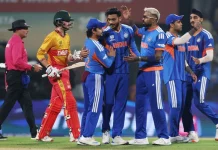Trump again offers Kashmir mediation Premier also meets global, US dignitaries to discuss IoK

From Jawad Raza Khan
NEW YORK: Prime Minister Imran Khan on Monday met US President Donald Trump in a televised event during which reporters were also present. They met on the sidelines of the UN General Assembly’s (UNGA) 74th session.
The two spoke about the ongoing situation in the Indian-occupied Kashmir, with PM Imran telling Trump that he felt that it was “the beginning of a crisis”.
Addressing the US president and the reporters, he said: “Trump heads the most powerful country in the world. And the most powerful country in the world has a responsibility.
“I honestly feel that this crisis could become much bigger. We look to the US to put out flames in the world,” the PM said.
Trump, on the other hand, noted that “many countries wanted to meet with me and we were unable to meet with them”. He added: “I will tell you this: You have a great leader. He’s a good man, a nice man. Happens to be a great athlete.”
Addressing a joint press conference alongside Prime Minister Imran ahead of their meeting, Trump once again offered to mediate between Pakistan and India on the Kashmir issue.
“If I can help, I will certainly do that,” he said. “If both (Pakistan and India) want, I am ready, willing and able to do it.”
The US president noted that Kashmir is a complex issue that had been going on for a long time, but emphasised that arbitration could not be carried out unless both parties involved welcome it.
Trump said he has a “very good relationship” with Indian Prime Minister NarendraModi as well as with Prime Minister Imran. He said he has never failed as an arbitrator in the past and would be available to help if asked.
Avoiding to directly answering to a question about UN resolutions on Kashmir, Trump reiterated that he is ready to play his role in South Asia if both India and Pakistan are willing.
Speaking about the US-Pakistan relationship, Trump said: “People in my position have treated Pakistan very badly.”
“I trust Pakistan but people before me didn’t, but they didn’t know what they were doing,” he said in response to a question.
“I trust this gentleman right here,” he added, pointing to Prime Minister Imran.
Trump said he has a lot of Pakistani friends in New York who are “smart” and “great negotiators”.
Commenting on Pakistan’s progress to counter terrorism, the US president said: “I have heard they have made great progress and I think he (Imran) wants to make great progress.”
Answering a question, Trump termed Iran as the “number one state of terror in the world”.
He said Iran is “doing very poorly”. He added when he took office, “Iran was a real threat to the entire Middle East and maybe beyond. And now they are having very very big difficulties to put it mildly.”
Earlier, PM Imran had told the Council on Foreign Relations (CFR) that he would make a new pitch to Trump to mediate on Kashmir, which is divided between Pakistan and India.
Trump met with the Pakistani PM a day after attending a rally in Houston that was organized by Indian PM Narendra Modi, a Hindu nationalist whose government last month revoked the Muslim-majority Himalayan region’s autonomy and cut off most ordinary people’s cellular and internet service.
The Trump-Khan meeting was the second one since July when the US president had offered to mediate on Kashmir dispute.
Trump also held telephone talks with the leaders of Pakistan and India in August amid the lock-down in the occupied Kashmir.
Earlier in the day, PM Imran met his British counterpart, Boris Johnson, over breakfast, and Chinese Foreign Minister Wang Yi called on the PM later.
The premier also spoke at the United Nations Climate Action Summit 2019 in New York shortly before meeting Trump.
Moreover, the US president once again offered to mediate between Pakistan and India on the issue of Kashmir and has expressed hope that the India and Pakistan will come together and resolve bilateral issues.
He also appreciated Prime Minister Imran Khan’s efforts in stabilizing regional peace.



